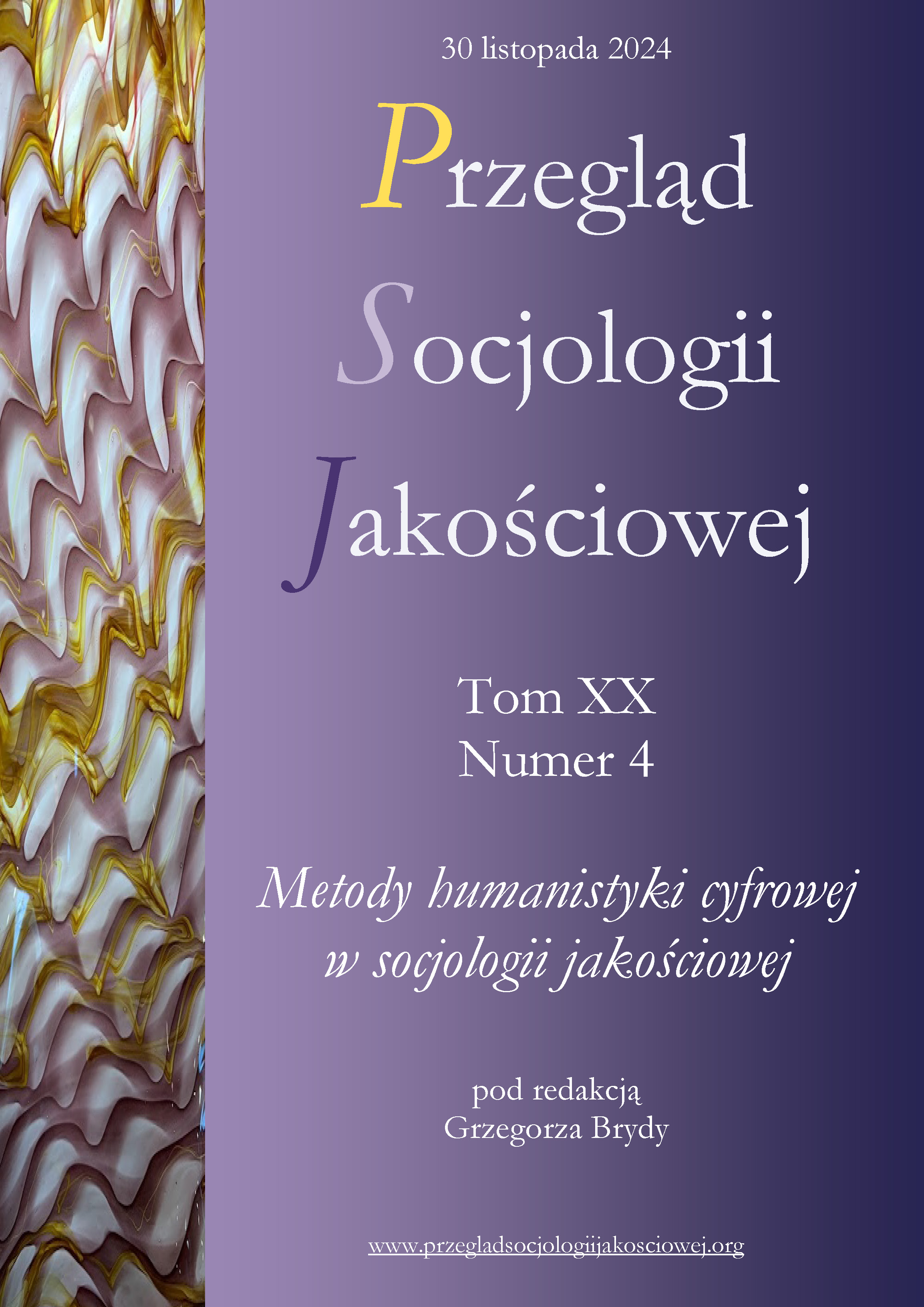The Methods of Digital Humanities in Qualitative Sociology
DOI:
https://doi.org/10.18778/1733-8069.20.4.01Keywords:
qualitative sociology, qualitative data analysis, digital humanities, artificial intelligence, natural language processing, digital qualitative sociologyAbstract
Qualitative sociology is undergoing significant changes and seizing new opportunities due to technological advancements such as artificial intelligence, machine learning, and natural language processing. These technologies are revolutionizing qualitative data analysis and offering new research and methodological perspectives. Artificial intelligence and machine learning automate data analysis, manage large datasets efficiently, and lead to more precise and rigorous conclusions while preserving the depth of qualitative research. Integrating the methods of digital humanities with qualitative sociology holds great promise for gaining better insights into complex social phenomena and processes. This “Qualitative Sociology Review” special issue highlights how the methods from within digital humanities can be effectively utilized in qualitative research and data analysis, providing theoretical and practical guidance for researchers. The articles in this issue offer analytical expertise, inspiring researchers to further explore and implement innovative methods of digital humanities and technologies in qualitative sociology.
Downloads
References
Bail Christopher A. (2014), The cultural environment: Measuring culture with big data, „Theory and Society”, vol. 43(3–4), s. 465–482.
Google Scholar
DOI: https://doi.org/10.1007/s11186-014-9216-5
Boyd Danah, Crawford Kate (2012), Critical questions for big data: Provocations for a cultural, technological, and scholarly phenomenon, „Information, Communication and Society”, vol. 15(5), s. 662–679.
Google Scholar
DOI: https://doi.org/10.1080/1369118X.2012.678878
Brosz Maciej, Bryda Grzegorz, Siuda Piotr (2017), Od redaktorów: Big Data i CAQDAS a procedury badawcze w polu socjologii jakościowej, „Przegląd Socjologii Jakościowej”, t. XIII, nr 2, s. 6–23, https://doi.org/10.18778/1733-8069.13.2.01
Google Scholar
DOI: https://doi.org/10.18778/1733-8069.13.2.01
Bryda Grzegorz (2024), Cyfrowa socjologia jakościowa. Odkrywanie językowego obrazu świata życia codziennego, Kraków: Wydawnictwo Uniwersytetu Jagiellońskiego.
Google Scholar
Bryda Grzegorz, Costa António Pedro (2023), Qualitative Research in Digital Era: Innovations, Methodologies and Collaborations, „Social Sciences”, vol. 12(10), 570, https://doi.org/10.3390/socsci12100570
Google Scholar
DOI: https://doi.org/10.3390/socsci12100570
Burdick Anne, Drucker Johanna, Lunenfeld Peter, Presner Todd, Schnapp Jeffrey (2012), Digital_Humanities, Cambridge: MIT Press.
Google Scholar
DOI: https://doi.org/10.7551/mitpress/9248.001.0001
Denzin Norman K., Lincoln Yvonna S. (2017), The SAGE handbook of qualitative research, Thousand Oaks: Sage Publications.
Google Scholar
Dieng Adji B., Ruiz Francisco J.R., Blei David M. (2020), Topic modeling in embedding spaces, „Transactions of the Association for Computational Linguistics”, vol. 8, s. 439–453.
Google Scholar
DOI: https://doi.org/10.1162/tacl_a_00325
Drucker Johanna (2013), Graphesis: Visual forms of knowledge production, Cambridge: Harvard University Press.
Google Scholar
Fielding Nigel G., Lee Raymond M. (2021), Qualitative data analysis: Integrating theory, method, and computer-assisted strategies, Thousand Oaks: Sage Publications.
Google Scholar
Gold Matthew K. (2012), Debates in the Digital Humanities, Minneapolis: University of Minnesota Press.
Google Scholar
DOI: https://doi.org/10.5749/minnesota/9780816677948.001.0001
Jockers Matthew L. (2013), Macroanalysis: Digital methods and literary history, Urbana: University of Illinois Press. Lupton Deborah (2020), Data Selves: More-than-Human Perspectives, Cambridge: Polity Press.
Google Scholar
Marres Noortje (2017), Digital sociology: The reinvention of social research, Cambridge: Polity Press.
Google Scholar
Moretti Franco (2013), Distant Reading, London–New York: Verso Books.
Google Scholar
Rosenzweig Roy (2003), Scarcity or Abundance? Preserving the Past in a Digital Era, „American Historical Review”, vol. 108(3), s. 735–762, https://dx.doi.org/10.1086/ahr/108.3.735
Google Scholar
DOI: https://doi.org/10.1086/529596
Salganik Matthew J. (2019), Bit by Bit: Social Research in the Digital Age, Princeton: Princeton University Press.
Google Scholar
Svensson Patrick (2016), Big Digital Humanities: Imagining a Meeting Place for the Humanities and the Digital, Ann Arbor: University of Michigan Press.
Google Scholar
DOI: https://doi.org/10.2307/j.ctv65sx0t
Underwood Ted (2017), Distant Horizons: Digital Evidence and Literary Change, Chicago: University of Chicago Press.
Google Scholar
Downloads
Published
Versions
- 2024-11-30 (2)
- 2024-11-30 (1)
How to Cite
Issue
Section
License

This work is licensed under a Creative Commons Attribution-NonCommercial-NoDerivatives 4.0 International License.














